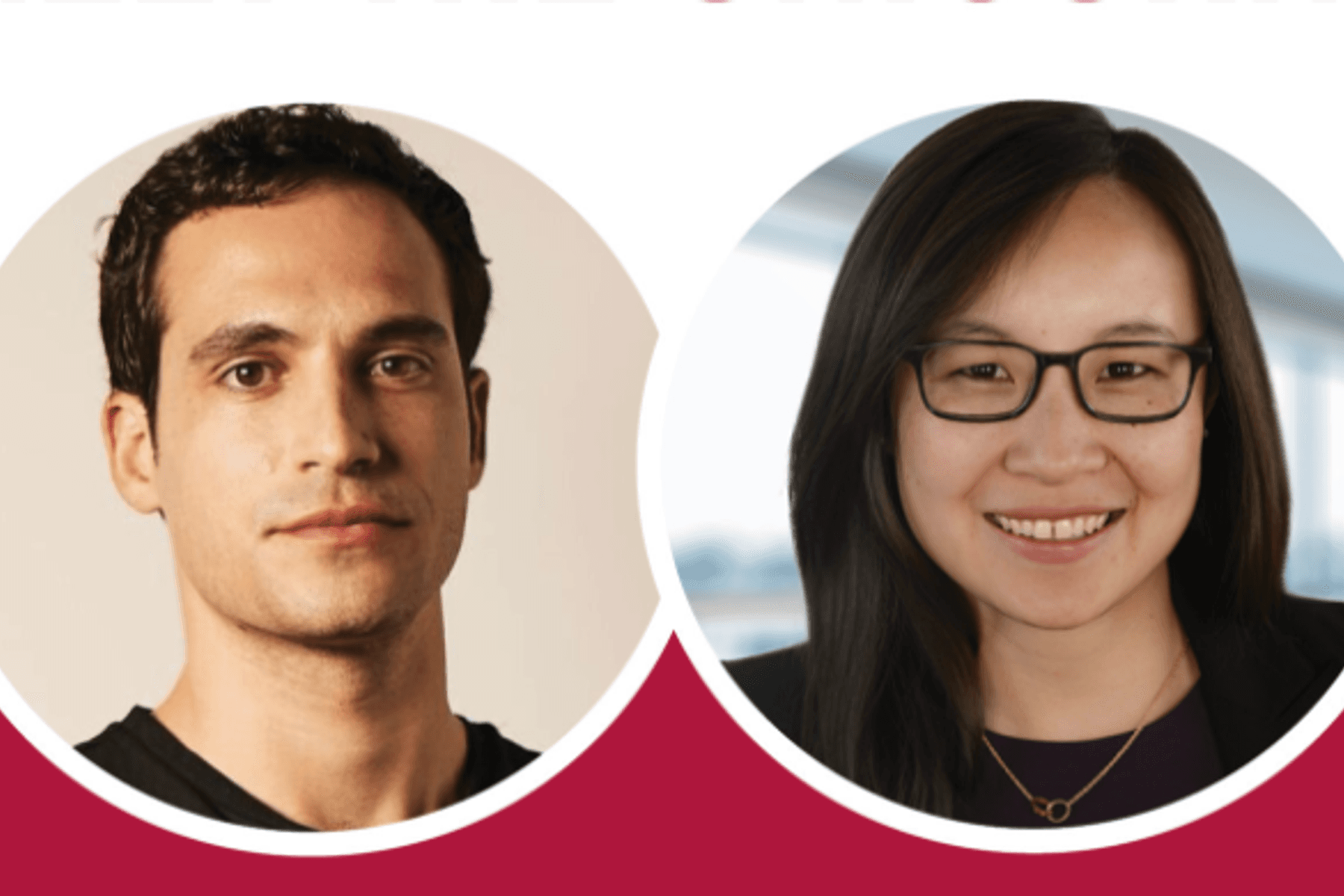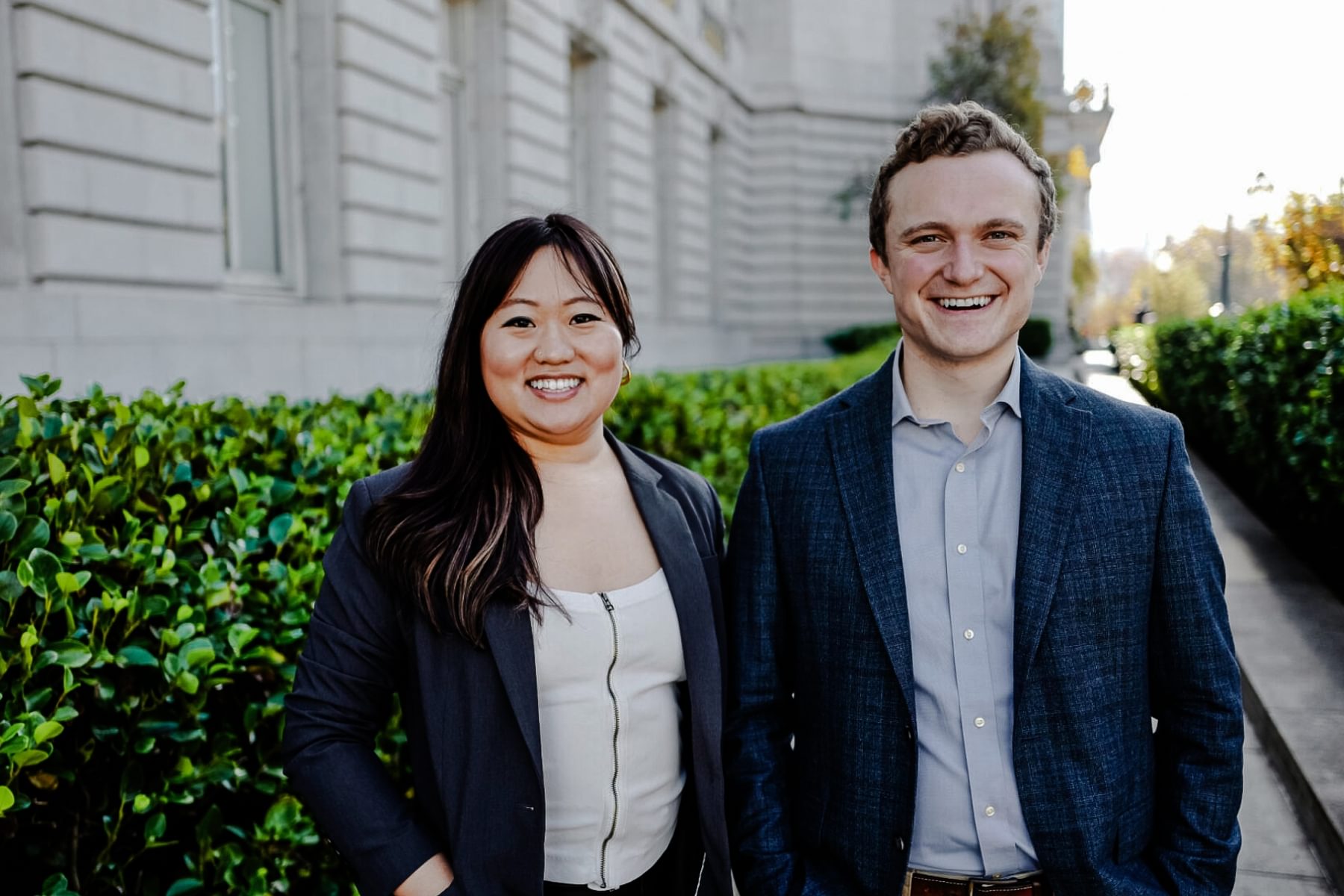Founders of two ventures that were incubated at the Harvard Innovation Labs (HIL) recently participated in a panel discussion about how their entrepreneurial journeys led them to a significant 2020 milestone: achieving billion-dollar valuations.
In any other year, this milestone would have likely been cause for an in-person celebration. But Will Ahmed (AB 2012), founder and CEO of human performance company WHOOP, and Lissy Hu (MD/MBA 2014), founder and CEO of care coordination software provider CarePort Health, made clear that achieving these valuations paled in significance to how their companies have impacted people’s health and well-being.
During the panel discussion, moderated by Harvard Innovation Labs Bruce and Bridgitt Evans Executive Director Matt Segneri (AB 2004, MBA 2010), Ahmed and Hu discussed everything from how they came up with the ideas for their ventures, to the ways their companies responded to the COVID-19 pandemic, and the most rewarding and challenging aspects of entrepreneurship. They also shared how Harvard played an instrumental role in their decisions to scale their companies here in Massachusetts, and encouraged Harvard students interested in pursuing entrepreneurship to take advantage of the resources offered to them through the Harvard Innovation Labs, Harvard Business School, and the wider Harvard community.
You can watch the full panel discussion with Ahmed and Hu:
A few of pieces of advice and anecdotes they shared included:
The benefits of starting a company go beyond positive business outcomes
In his opening remarks, Ahmed talked about the incredible personal growth that can happen if you decide to start a company. He said, “There were plenty of times along the period of the last nine years where WHOOP came quite close to failing. But I think even if WHOOP had failed, I certainly wouldn’t have regretted starting the company because of how much it’s taught me about building a business, building a team, raising capital — all these different things. And I think in the risk/reward analysis that many students may make in terms of starting businesses, it’s often focused on what’s the outcome going to be of this business, and it’s probably less focused on what’s the potential for the individual in terms of what you may learn about yourself or how you may develop.”
Focus on how your startup can make meaningful contributions to people’s lives
When COVID-19 hit the U.S., both WHOOP and CarePort quickly identified ways that their companies could have the greatest impact on helping people through the pandemic.
Hu commented, “Most of the hospitals in New York City use our tool. Immediately what we were hearing from our customers was that, one, we’re having trouble finding places for COVID-19 patients to recover...how can you help us find out which places can take recovering covid patients. And it was compounded by the fact that the care continuum is like a pipe— if you can’t get patients out of the hospital, you can’t get them into the hospital. People began to see this process of getting patients out of the hospital and into care settings is more critical than ever before. We basically threw away our entire product roadmap, and just started looking at how can we facilitate some of these transitions out of the hospital... It turned out to help a lot of the hospitals we were working with, it turned out to help a lot of the nursing homes we were working with, and 2020 ended up being our best year in sales yet.”
Ahmed said, “We started researching COVID-19 in January 2020... By early March, we were the first consumer app to add COVID-19 tracking, the thinking being if we could build a dataset around WHOOP data and COVID-19...maybe we could give back to the scientific community. By the end of March, we had over 2,000 people report having testing positive for COVID-19... We were able to partner with Cleveland Clinic, we were able to partner with CQU, and by the summer we had published research showing how specific metrics related to COVID-19 show up in your physiology.”
In the early days, get used to living with uncertainty
When discussing the very beginning of her startup journey, Hu said, “There's so much uncertainty, and that was something I really had to get used to. I remember getting all spun up about what’s the cost of customer acquisition, and what is my sales cycle going to be like, and what is the revenue model going to be like? What I would say to myself now... would be at every stage of the company, you’re trying to solve a different problem, and at those very early stages, it’s ok to not know a lot of those things...You’re trying to figure out...does my product work for the particular problem that I’m going to solve? Is there really a problem here, how painful is the solution, and is what I’m building actually going to work?”
Listen to criticism, but stay true to your vision
Whether you’re pitching prospective investors, or seeking advice from mentors, Ahmed discussed the importance of believing in your vision. He commented, “You should try to listen to what people say, but I think it’s important you don’t zig and zag with every person you meet. I just remember so many meetings with someone telling me why I was doing it wrong or had the wrong point of view, and it’s pretty discouraging...and there’s no other way to say it. But you can overcome it...and a positive way to look at it is, if that many people disagree with you, and you end up being right, the stakes are going to be quite high for being right. That means you see a nuanced thing about the market that other people maybe don’t see... If you hear the same exact thing over and over, maybe you might want to think more about it, but even then, you have to have strong conviction in the direction you’re going.”
If you’re a student who’s considering starting a venture, do it
When discussing whether to start a venture as a student, Hu commented, "Just go for it. For every reason to do it, there’s 20 reasons not to. People always think that entrepreneurship is so risky. But I remember one of my HBS classes, one of the professors said, ‘You think that big companies are safe, and they’re not.’ They can change strategies, they can go in a different direction, they can do M&A, so this whole thing about a big company being safe, versus a startup being risky, is in some ways just a big fallacy.”
Ahmed added that Harvard offering entrepreneurial resources was good not just for WHOOP, but also the Greater Boston economy. He said, “Today, WHOOP is planning to stay in Boston as we grow to being thousands of people in the coming years. That’s a hugely important thing the i-lab has done… It’s made companies, I believe, stay in Boston, that may otherwise have gone elsewhere. I remember my senior fall year, thinking, ‘WHOOP will end up in Manhattan, or maybe I should go out to the West Coast.’ But because the i-lab was there for the first 18 months, and because I was able to get access to investors and professors and students and even sports teams... it kept us in Boston. So here we are creating jobs for the city... I'm grateful to be here, [and] grateful for the i-lab."





